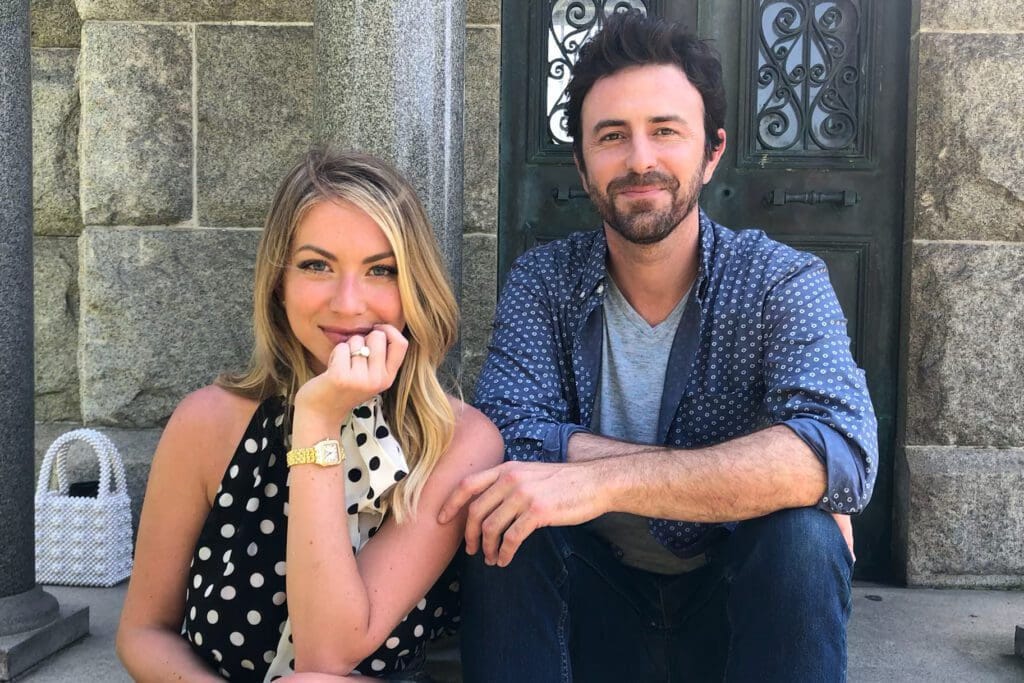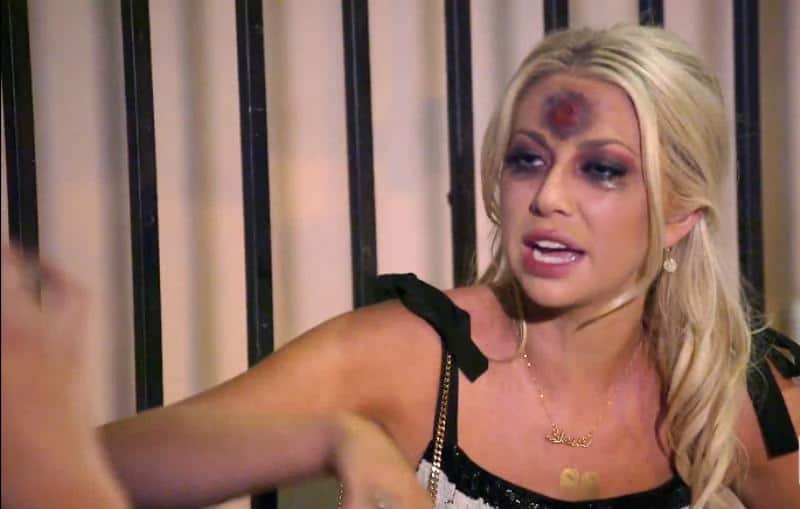Bringing Up Baby
more VPR talk, and how the love between a normal man and a demented woman is beautiful
The first crush I had in elementary school was terrified of me. Like my current boyfriend, his name was Brian, and he probably couldn’t have cared less if I had died right in front of him. He was a quiet, bookish fellow kindergartner with no memorable personality to speak of; not a classmate, but a peer I’d likely have encountered at lunch or in the hallways in between class. I was not quiet or bookish, and I had a lot of personality — I was obnoxious and weird, wildly passionate and unbothered by people who didn’t like that.
With no frame of reference aside from zany cartoons in which characters abused one another with weapons and explosives, my way of getting Brian’s attention was to torment him a la Rosalind Russell to Cary Grant in Bringing up Baby decades before I’d ever see the film. I can remember a time when Brian held the door as my class filed out into the hall and I attempted to grab at his cheek with my little hand. He responded by recoiling in disgust. My second crush downright hated me, another reserved child who was put off by my unbridled determination and enthusiasm. I wrote a poem for my third crush — yet another quiet, normal young man — about how I was going to kill his then-girlfriend (we were 11), and on top of that I let my classmates read it. It never occurred to me that I shouldn’t behave this way in order to get a boy to like me back, to not emulate the social boundary-ignorant Looney Tunes characters I’d leeched part of my personality off of. In my growing child brain, I must have rationalized that all I needed to do to get a boyfriend was to be myself and get their attention. Any press is good press, as the saying goes.
Me and Stassi Schroeder don’t have a ton in common — I was not a Queen Bee popular girl, I never terrorized my coworkers needlessly; I didn’t date guys like Jax Taylor. But I know how it feels to be a little too much for everyone, to fear that you will fall in love and then drive them away. Like Lorde muses about on her song “Liability;” like Stassi once twisted herself into self-destructive knots over in fear that the man who turned out to be her husband would abandon her. In rewatching Vanderpump Rules (holding my boyfriend’s hand, leading him with bated breath to the climactic television phenom that is Scandoval), I’ve discovered a much deeper appreciation for SUR’s resident mean girl, and the way parts of her personality and ideal dynamic with her boyfriend-now-husband, Beau Clark, quite notably mirror my own.
I feel like this is less of an essay than a series of observations I want to exorcise, which I’ve been holding onto in the little notes app in my mind, as Brian and I have been traversing our way through the Bravo series. We just recently fired up Season 9, ever closer to Scandoval but probably the worst season next to Season 11, when all our of friends post-lockdown are living in giant, hideous houses, driving expensive cars, injected up the ass with fillers and botox and babies, and the entire point of the show has been killed off and buried in a shallow grave. Anyway, I have always liked Stassi in particular, although it took me a moment after becoming acquainted with her when I first watched the show. During those first couple seasons — as I’m sure rings true for many other viewers — Stassi reminds me of the girls who used to bully me in school: desperate to be the center of attention, nurtured by a harem of submissive acolytes, cruel for no reason other than to establish dominance over other women. In her early twenties, Stassi was relentlessly nasty and shameless (“It’s my fucking birthday,” a classic). She often displayed a level of deluded narcissism that fomented into pure emotional chaos.
Everyone already knows this, but bullying and wild displays of attention-seeking tend to be symptomatic of a void that isn’t getting addressed elsewhere. And as Stassi grows up and matures into her late twenties and mid-thirties, that void within her slowly claws its way to the surface. It manifests less as emotional maelstrom and instead as a lump in her throat that she just can’t swallow. As she attempts to deal with her feelings, she vexes herself and others, like a toddler trying to understand why their parents’ decision to move the couch from up against the wall to the center of the living room has made them cry. Stassi’s outbursts become less messy and all-encompassing, but instead they are localized to Beau. Here, she struggles to articulate her emotions and he patiently, if frustratedly, attempts to work through them along with her1. She wants to understand why she becomes, as she calls it, “The Dark Passenger,” because it is clearly some sort of trauma response that has never been fully confronted.
For Stassi, this trauma response is the fear of being abandoned. It’s difficult to say the scope to which her history with unfaithful men and her parents’ own complicated — to put it lightly2— relationship has fostered this, but it has at least been partly informed by the way her parents view her and her personality. In one of the most infuriating and heart-breaking moments on the show, Stassi’s mother drunkenly compliments Beau while chiding her own daughter in front of him. “I don’t want you to be yourself and fuck it up,” her mother laughs, indicating that Beau is “too good” for Stassi. In a later episode scene, in which Beau phones Stassi’s father and asks for permission to marry her, Stassi’s father says something half-jokingly to the effect that Stassi won’t ever make a good wife. Both of Stassi’s own parents outwardly denigrate their daughter’s personality. At the same time, as Stassi evolves from season to season, it becomes clear that she is a weird girl in the body of a basic bitch3. She openly adores death and murder, frequently references detailed ways she wants to kill people4, and once threw herself a murder-themed birthday party where she dressed up as a zombie with a gunshot wound to the head. Stassi is genuinely a bit odd; in another life, she would have been the perfect goth.
Stassi is also, clearly, a lot, which is something I took a little longer to come to terms with about myself. As I watched this young woman grow up rapidly on my television, I saw more of myself in her personality, in what she desires out of a romantic partnership, and what she really needs. Stassi’s bizarre interests, unruliness, and clingy, high maintenance behaviors are aspects of her personality that her other partners, like the evil podcaster Patrick, try to suppress. Or, in the case of America’s Sweetheart Jax Taylor, their personalities are somewhat matched to the extent that they are two positive cathodes working in opposition to one another. Like Stassi, I’ve struggled for a long time to find a partner who matches up with my personality, but I’ve also struggled to accept that I really am clingy and high maintenance. When I was a young child, I somehow managed to implicitly grasp and pull towards the dynamic of the wacky, unpredictable dame pursuing the reserved, serious man, because every single one of my childhood crushes was a quiet boy who could not deal with my shit. Except I didn’t end up with them like Rosalind Russell and Cary Grant. Unlike Stassi, I didn’t compartmentalize my weirdness, and my parents didn’t discourage my personality. I just became the weird girl that nobody wanted to be around.
Still, since none of the boys I liked could deal with me as a child, I basically became a “cool girl” as I got older, better adjusted, and more “likable.” I know, I know: I was a “pick me,” how gauche. I was still weird (I’m still weird) and so were all my friends. But I prided myself on being chill and down-to-earth, having more male friends than female ones; attracting guys who wanted to kill themselves, for some reason5. Post-high school, my partners and crushes varied. I did date a couple nice, normal young men, but I was still under the impression that I should continue being “the cool girl.” In part, because of this, I was never fully myself in relationships, never totally at ease, never completely vulnerable and secure with the other person. So, I pursued people who were not a good match for me. In one extreme case which harkens back to my days of being nutty and love-obsessed on the playground, I chased a guy desperately for a few years, convinced that if I altered my personality and interests enough to be the ultimate “chill girl,” he would realize that we were actually soulmates. Of course, my ironic attempt at this insane persona heel-turn exemplified that I was not, in fact, chill at all.
Stassi and Jax were like two dueling hurricanes, whereas Patrick dominated Stassi until she was a shadow of herself. In both cases, Stassi is neither happy nor comfortable, nor her fullest, truest self. When Stassi throws her “murder-themed birthday party” in Season 6 Episode 8, Patrick refuses to indulge her, one of the only people to show up to the celebration without any on-theme costume — and he’s her BOYFRIEND. It blatantly disrespects her, demonstrating that he views her quirks as embarrassing. Whereas Jax brought the worst out in Stassi’s personality, Patrick didn’t like any of it. I’ve thankfully never dated a full Patrick, but my last relationship could be vaguely comparable to a Stassi/Jax dynamic with bits of Patrick sprinkled in: two needy, sensitive, emotionally volatile personalities clashing over and over until they rejected one another completely.
Watching Stassi and Beau together in the last couple seasons (before both of them leave the series for good) is intoxicating. Beau is an amiable guy, very plainly soft-hearted and emotionally mature. He doesn’t take himself too seriously, he is kind, and he makes his love for Stassi and all her idiosyncrasies outwardly known. It is obvious how happy Stassi is with him whenever they’re filmed together, and it’s obvious that Beau allows her to be herself free from judgment. Season after season, Stassi stews with pent-up resentment and rage, lashing out at her friends and self-destructing over and over, and it is such a release to see her finally, mostly at ease with both herself and her partner. When Beau bends down on one knee and proposes to Stassi in the middle of a cemetery — where Stassi had taken him to go “mausoleum shopping” — it operates in direct contrast with how Patrick treated Stassi’s murder party. Beau openly admits that Stassi terrifies him, that her fixation on death is weird. But when he says these things he does so with a smirk on his face and pure adoration in his eyes. Yeah, the woman he loves is a fucking freak, and it’s awesome.
The thing about Stassi and Beau is that both of them bring out the best in each other: Beau is patient with Stassi and keeps her grounded, unafraid to speak up when she’s crossing a line, while Stassi’s eccentricities give Beau the space to be weirder and more carefree. Together, their partnership is finally one which functions as a team, where there is give and take in what each person has to offer the other; a true symbiotic relationship. And because it’s so good, Stassi attempts to self-immolate, a subconscious response born out of the expectation that she will be too much for him anyway. Much of this is fear of abandonment engendered by past relationships with men like Jax, but I genuinely believe that most of it is because of her parents. Stassi has never before been with a guy like Beau, who can both handle who she is and encourages her to be it — and it terrifies her. Her own mother said to her “I don’t want you to be yourself and fuck it up.” Stassi has been coached to view her restless, blustery personality as unattractive and repellent to men, yet she is clearly a product of the people who raised her. Perhaps born into a different family, Stassi’s repressed, weird-girl tendencies may have flourished, and in another timeline we’d have been emo allies. Instead, she grew into a tempestuous brat who believed that she must conceal part of herself or otherwise face rejection.
And like Stassi, I spent the better part of my last relationship in fear of being abandoned; although unlike Stassi’s end result with Beau, ultimately I was. Part of it was the unspoken understanding that the person I’d chosen to be with was, to some degree, not emotionally ready for a serious, long-term partnership. But I think I was also scared of the fact that I was so incredibly myself with another person for the first time in my life. Though the relationship bore a dearth of problems, I was, at the time, happier and more comfortable than I had ever been with a man, and I was petrified to lose that. The last time I was my most authentic while pursuing men, I was a child who scared them all away. Still, when I did lose this relationship, I never once believed that the abandonment was my fault, and I didn’t come away from it emboldened by a resolution to change myself in order to fall in love again, or go back forcing myself to be a “cool girl.” I think that as you get older, you become more tolerant of who you are. “Self-love” is such an annoying turn of phrase, but like Popeye says: “I yam what I yam.” If your twenties are for self-discovery, then your thirties are for discovering that who you are is good enough, and everyone can just fucking deal with it.
Because as I’ve matured, I’ve come to terms with things about myself that I never wanted to admit when I was younger. For one, I am not a cool, chill girl. When it comes to relationships, I am crazy, high-maintenance, high-strung, needy, clingy, neurotic, and desperate for attention. I want to be loved and tended to 24/7, I want someone who is willing to give that to me, and I won’t settle for anything less. Like my embracing of my intolerance for living with roommates after being shamed about it in my last relationship and realizing “no, actually, I LIKE being uptight about my living space”, accepting my ideal boyfriend dynamic a few years ago was incredibly liberating. I’ve spent too long trying to pretend that it would be better if I was the cool girl, if I could coast unbothered by unanswered texts, if I could play aloof and hard to get; if I could not hopelessly yearn after only two days apart. But that’s simply not who I am, it never will be, and I will never posture as otherwise ever again.
And the only kind of guy who can handle a girl like me or Stassi are nice, normal, good-natured men who are mystified by a dizzy dame. They are bemused and slightly terrified by our intensity, but can’t help being intrigued by the challenge — and the passion — of existing in our orbit, and they fall for it. Demented women need a no-nonsense man to anchor their free-wheeling whims, and no-nonsense men need a demented woman to scoop them up in a delivery bike and peddle them haphazardly through the geographically perilous streets of San Francisco. I didn’t know it when I was a kid, but the most beautiful hetero dynamic that exists on this earth was epitomized in What’s Up, Doc?, and I was not incorrect to approach schoolboys with the uninhibited fervor of a cartoon character. The Dr. David Huxleys and Dr. Howard Bannisters of my youth may have rejected my wiles, but they paved the way for one who didn’t. I pray that in the end, they all found their Judy Maxwells, anyway.
His mom, who appears on the show, is a kind of weird if well-meaning woo-woo type relationship therapist.
Both of Stassi’s parents are divorced and have been remarried at least three times; they are also both total lunatics and seem like genuinely very bad people.
This is not mean, it is how Stassi describes herself; she wrote a whole book about it.
I was not quite so thorough, but Stassi would have deeply respected that poem I wrote.
Ok, that’s unrelated to being a chill pick me, but I’m just throwing it in there because it’s true.







Loved this and love how this substack is coming along, Bri!! 👍🏻